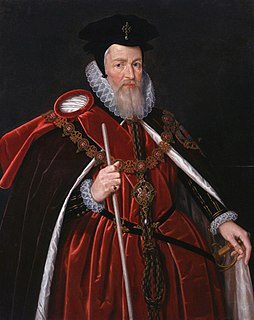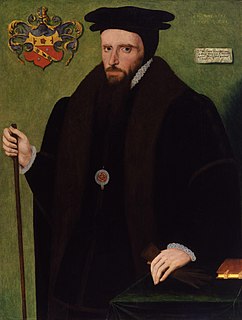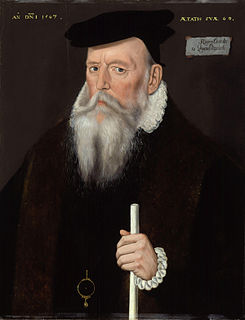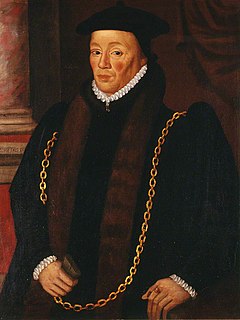
William Cecil, 1st Baron Burghley was an English statesman, the chief adviser of Queen Elizabeth I for most of her reign, twice Secretary of State and Lord High Treasurer from 1572. In his description in the Encyclopædia Britannica Eleventh Edition, Albert Pollard wrote, "From 1558 for forty years the biography of Cecil is almost indistinguishable from that of Elizabeth and from the history of England."

Henry Stuart, Lord Darnley, was an English nobleman who was the second husband of Mary, Queen of Scots, and the father of James VI of Scotland and I of England. Through his parents, he had claims to both the Scottish and English thrones, and from his marriage in 1565 he was king consort of Scotland. Less than a year after the birth of his son, Darnley was murdered at Kirk o' Field in 1567. Many contemporary narratives describing his life and death refer to him as Lord Darnley, his title as heir apparent to the Earldom of Lennox, and it is by this appellation that he is known in history.

Thomas Howard, 3rd Duke of Norfolk, was a prominent English politician and nobleman of the Tudor era. He was an uncle of two of the wives of King Henry VIII, Anne Boleyn and Catherine Howard, both of whom were beheaded, and played a major role in the machinations affecting these royal marriages. After falling from favour in 1546, he was stripped of his Dukedom and imprisoned in the Tower of London, avoiding execution when Henry VIII died on 28 January 1547.

Francis Russell, 2nd Earl of Bedford, KG of Chenies in Buckinghamshire and of Bedford House in Exeter, Devon, was an English nobleman, soldier, and politician. He was a godfather to the Devon-born sailor Sir Francis Drake. He served as Lord Lieutenant of Devon (1584-5).

William Howard, 1st Baron Howard of Effingham was an English diplomat and military leader. He served four monarchs, Henry VIII, Edward VI, Mary I and Elizabeth I, in various official capacities, most notably on diplomatic missions and as Lord Admiral and Lord Chamberlain of the Household.

Sir William Petre was Secretary of State to three successive Tudor monarchs, namely Kings Henry VIII, Edward VI and Queen Mary I. He also deputised for the Secretary of State to Elizabeth I.

Sir Nicholas Throckmorton was an English diplomat and politician, who was an ambassador to France and later Scotland, and played a key role in the relationship between Elizabeth I of England and Mary, Queen of Scots.
Patrick Ruthven, 3rd Lord Ruthven, played an important part in the political intrigues of the 16th century Scotland. He succeeded to the lordship in December 1552. The Ruthven lordship encompassed the offices of Provost and Constable of Perth, and Sheriff of Strathearn.

James Pilkington (1520–1576), was the first Protestant Bishop of Durham from 1561 until his death in 1576. He founded Rivington Grammar School and was an Elizabethan author and orator.

William Douglas of Whittingehame was a Senator of the College of Justice at Edinburgh, and a Royal conspirator.
Thomas Randolph (1523–1590) was an English ambassador serving Elizabeth I of England. Most of his professional life he spent in Scotland at the courts of Mary, Queen of Scots, and her son James VI. While in Scotland, he was embroiled in marriage projects and several upheavals. In 1568-1569 he was sent on a special embassy to Russia, visiting the court of Ivan the Terrible.
Christopher Goodman BD (1520–1603) was an English reforming clergyman and writer. He was a Marian exile, who left England to escape persecution during the counter-reformation in the reign of Queen Mary I of England. He was the author of a work on limits to obedience to rulers, and a contributor to the Geneva Bible. He was a friend of John Knox, and on Mary's death went to Scotland, later returning to England where he failed to conform.

Sir Edward Rogers was an English gentleman who served as an Officer of State in various capacities during the Tudor period. He rose to become Comptroller and Vice-Chamberlain of the Household to Elizabeth I of England from 1560 to 1568.

Sir William Garrard (1518–1571), also Garrett, Gerrarde, etc., was a Tudor magnate of London, a merchant citizen in the Worshipful Company of Haberdashers, who became alderman, Sheriff (1552–1553) and Lord Mayor of London (1555–1556) and was returned as an MP for the City of London. He was a senior founding officer of the Company of Merchant Adventurers to New Lands in 1554/55, having been involved in its enterprises since the beginnings in King Edward VI's time, and for the last decade of his life was one of its permanent governors. He worked hard and invested largely to expand English overseas trade not only to Russia and the Levant but also to the Barbary Coast and to West Africa and Guinea.

Henri Cleutin, seigneur d'Oisel et de Villeparisis, was the representative of France in Scotland from 1546 to 1560, a Gentleman of the Chamber of the King of France, and a diplomat in Rome 1564-1566 during the French Wars of Religion.

John Cockburn, laird of Ormiston, East Lothian, Scotland, was an early supporter of the Scottish Reformation. He was the eldest son of William Cockburn of Ormiston and Janet Somerville. John was usually called "Ormiston." During his lifetime there was also a laird of Ormiston in Teviotdale near Eckford, a member of the rival Hepburn family.
Sir Edmund Rous, of Dunwich, Suffolk, was an English landowner, magistrate, MP and Vice-Treasurer of Ireland.

Richard Corbet was an English landowner and politician who represented Shropshire in the parliaments of 1558 and 1563.
Sir John White or Whyte of Aldershot and London was Lord Mayor of London 1563-64. He was knighted by Elizabeth I in 1564. He lived during the reigns of Henry VIII, Edward VI, Lady Jane Grey, Mary I, and Elizabeth I.

Christopher Rokeby, Rokesby, Rooksby, or Rooksbie was an English soldier and secret agent.














